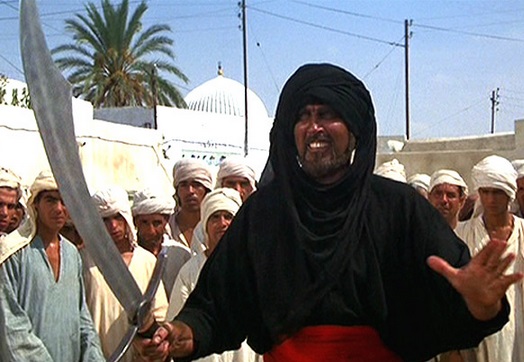  |
 |
 |
 |
|
MahdiWatch.org
|
 |
|
Home | About Me | Links to My Articles | Info on My Books | Contact Me
|
 |
|
Welcome to MahdiWatch.org! NEWSFLASH! COMMENTS LINK
BELOW EACH POST IS ENABLED! FEEL FREE TO BURY ME, PRAISE ME--OR JUST ISSUE A PERSONAL FATWA!
al-Mahdi is "the rightly-guided one" who, according to Islamic Hadiths (traditions),
will come before the end of time to make the entire world Muslim. Over the last 1400 years numerous claimants to the
mantle of the Mahdi have arisen in both Shi`i and Sunni circles. Modern belief in the coming of the Mahdi has
manifested most famously in the 1979 al-`Utaybi uprising of Sa`udi Arabia, and more recently in the ongoing
Mahdist movements (some violent) in Iraq, as well as in the frequently-expressed public prayers of former Iranian
President Ahmadinezhad bidding the Mahdi to return and, in the larger Sunni Islamic world, by claims that Usamah bin Ladin
might be the (occulted) Mahdi. Now in 2014 Mahdism is active in Syria, as the jihadist opposition group Jabhat al-Nusra
claims to be fighting to prepare the way for his coming; and in the new "Islamic State/caliphate" spanning
Syrian and Iraqi territory, as its leadership promotes the upcoming apocalyptic battle with the West at Dabiq, Syria. This site will track such Mahdi-related movements, aspirations, propaganda and beliefs in both Sunni and Shi`i
milieus, as well as other Muslim eschatological yearnings.
For a primer
on Mahdism, see my 2005 article, "What's Worse than Violent Jihadists?," at the History News Network: http://hnn.us/articles/13146.html; for more in-depth info, see the links here to my other writings, including my book on Mahdism.
|
|
|
|
Sunday, April 18, 2010
Out of Africa: Caliphate and Islamic Violence
Last week the Pew Forum on Religion
& Public Life released the results of a survey done among Christians and Muslims in 19 African countries. Here is an analysis of two topics in that study, based on a reading of the executive summary (pending a chance to fully read and digest all 331 pages of the entire report):
1) Religious utopianism
*61% of Christians
expect Jesus to return during their lifetimes (ranging from 50% in Nigeria to 69% in Congo)
*52% of Muslims expect the restoration of the caliphate in their lifetimes (from 29% in Sengal to 69% in Mozambique).
While Pew subsumes both these beliefs under the “end times” rubric, that is not really accurate—unless
the latter is connected, among Muslims, to the belief that the Mahdi will come/the 12th Imam return to impose a
new (global) caliphate, in which case it does become functionally eschatological. Also, note that
a belief in the return of Jesus is not political, whereas hope for bringing back one-man rule in the Islamic ummah
most certainly IS political. Pew also, for some inexplicable reason, conflates both Christian
belief in Jesus’ imminent return and Muslim belief with “intense religious experiences, including divine healings
and exorcism.” But, again, those topics are really apples and oranges—and, indeed, kiwis.
Charismatic, conservative Christianity—which now includes not just Pentecostals, but many members across the
denominational spectrum in Africa—is more analogous to early Christianity (see Michael Green’s
1970 Evangelism in the Early Church, pp. 192ff and notes 170, 171, p. 324) than to the political Islam that has taken
root even in Africa.
2) Religious violence
*“In
seven countries, roughly one-third or more of Muslims say they support the death penalty for those who leave Islam”
*There is “considerable support among Muslims in several countries for…stoning
people who commit adultery and whipping or cutting off the hands of thieves.”
*43% of Christians see Muslims as violent, while only 20% of Muslims see Christians as violent”
*“[I]n almost all countries in which Muslims constitute at least 10% of the population, Muslims are more concerned
about Muslim extremism than about than they are about Christian extremism.”
Pew attempts to spin this data with rubrics such as “Muslims More Widely Seen as Violent
than Christians,” and “Support for Biblical or Sharia Law Is Widespread.” Yet
the stubborn, politically-incorrect fact is this: the Qur’an, read literally (as is mandated in historical Sunni Islam), mandates violence against non-Muslims, whereas in the Bible, for Christians,
the pacific teachings of Jesus and the Apostles in the New Testament trumps any Yahweh-sanctioned violence in the Old Testament.
This major point is conveniently overlooked by Pew, in the organization’s dhimmi-istic attempt to make
Christianity and Islam appear equally violent. Pew’s own data undermines this attempt, as well:
note that Muslims themselves are much more concerned about violence within their own ranks than with that of Christians, and
that there is NOTHING analogous in Jesus’ teachings to Muhammad’s allegedly divine punishments of stoning and
sawing off of limbs.
9:58 am edt
Thursday, April 15, 2010
Der Mahdi?
Today Daniel Pipes posted a long, and positive,
review of Jeffrey Herf’s book Nazi Propaganda for the Arab World which uses as source material “summary accounts of Nazi shortwave radio broadcasts in the Arabic language”
in the 1930s and 1940s which were aimed at turning Arabs against the Jews and promoting Islam as compatible with National
Socialism and Hitler’s geopolitical aims. I hope to read the book myself soon, but in the interim
this particular aspect of Herf’s book, as reviewed by Pipes, struck me: “Specifically
for Shi'ites, the Nazis hinted at Hitler being the awaited Twelfth Imam or the Muslim eschatological figure of Jesus, who
will fight the anti-Christ (namely, the Jews) and bring on the end of days.” If
Indy had just known, maybe he wouldn’t have hated Nazis so much….

Famous American archaeologist, in disguise, asks The Mahdi
to sign his personal copy of the
Qur'an.
Tuesday, April 6, 2010
The "Soft" Mahdism of Neo-Ottoman Expectations
Much virtual ink
has been spilled, recently, about the global Islamic movement headed by the Turkish expatriate Fethullah Gülen (who, two years ago, was ranked the world’s #1 public intellectual). Many analyses are positive, whether intensely or mildly so; others , on the contrary, portray Gülenists as crypto-Islamists threatening not just
Turkey but the United States. I’m still forming my opinion of this
movement, but at this juncture I tend to side with those who see the Gülenists as neo-Ottoman Sufis (or perhaps neo-Sufi Ottomans?) rather than as Muslim Brothers with moustaches.
One important aspect of Gülenist
ideology that often gets missed by commentators is its sub rosa, “soft” Mahdism, which derives from Fethullah
Gülen’s own personal adherence
to the teachings of Bediüzzaman Said Nursi (d. 1960) as elucidated by Zeki Saritoprak. Nursi was a late Ottoman/early Turkish Republic Islamic thinker
and writer who was heavily influenced by Turkish Sufism. And Sufism, with its mystical and charismatic proclivities,
has always been quite susceptible to Mahdist trends—Nursi’s Sufi leanings being no exception. He
did, however, differ with traditional Sunni Mahdist thought on some levels: for example, according to Saritoprak, “we
may say…that in Bediüzzaman’s
view every age has its Mahdi,” from which “it is understood…that the Mahdi is not an individual.”
Most importantly, “he [Nursi] does not consider the Mahdi to be someone who will
set everything in order…with the sword. He sees him [the Mahdi] as a normal human being and great
reformer” who will “revive the Sunna of God’s Messenger” and whose “service
will become increasingly brilliant until the start of the 16th century of the Hijra, following which an evil movement
will gain dominance.” But Nursi’s thought seems to exhibit some cognitive dissonance on the
topic of the Mahdi: while in some writings he stresses the non-individual concept of
the Mahdi as almost a Star Wars-like “force” rather than a person, in other places Nursi does admit that “the
Great Mahdi expected at the end of time is the last of the Mahdis and reformers.”
Observations:
1) Nursi’s/Gülen’s pacific Mahdism is a welcome break from the normal martial messianic view of the Mahdi espoused
in many Sunni, and some Shi`i, sources (and embodied by any number of self-styled Mahdis over the last millennium of Islamic
history); however….
2) This
same view of the Mahdi as an apolitical mujaddid, “reformer,” who exists in every
age also allows for relative ease in donning the mantle of the Mahdi by a sufficiently self-assured, pious and charismatic
Muslim leader—as may very well be the case with Fethullah Gülen himself, or with another prominent, Nursi-influenced Turkish Mahdist, Adnan Oktar (whom I interviewed , in Istanbul, in 2008).
3) The 16th Islamic century begins in 2076 AD. Thus, Said
Nursi and, presumably, his disciple Gülen both see the first three-quarters of the 21st century
as a period of increasing Mahdist, and almost certainly Turkish, influence. Will the Mahdi restore the Ottoman caliphate before the American tricentennial?
4) Someone, somehow, needs to ascertain the extent to which neo-Ottoman Nursian Mahdism influences
the ruling AK Party in Turkey. It may be that Turkey’s soft Mahdism proves more problematic to the
West, in the long run, than Iran’s harder version.
|
|
|
|
| Jamkaran Mosque near Qom, Iran (during my trip there Aug. 2008) |
|
|
|
